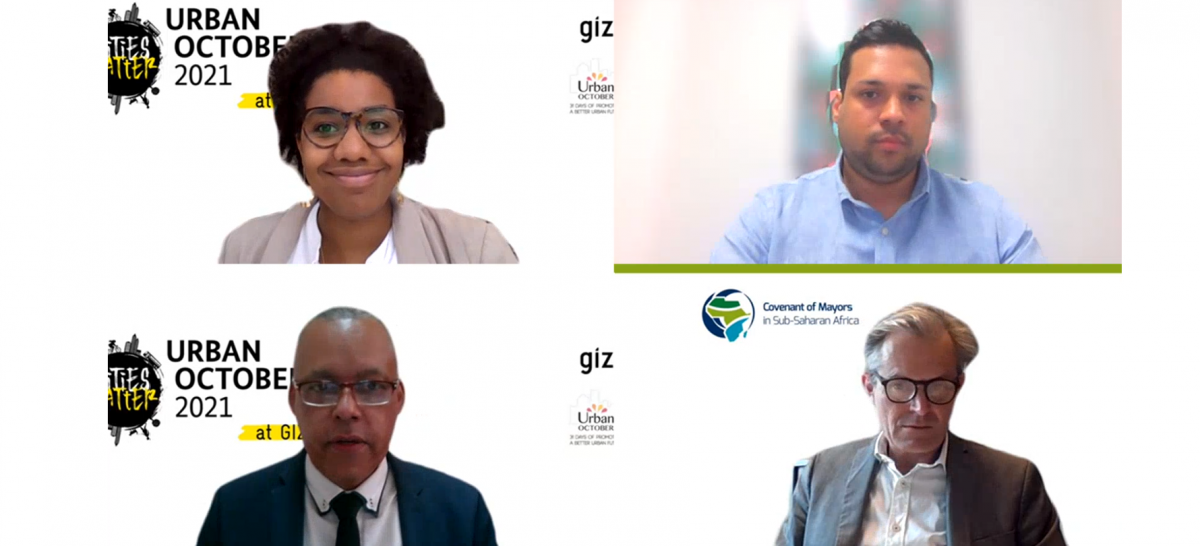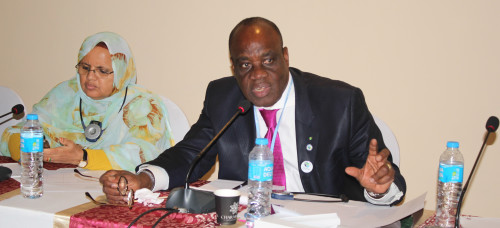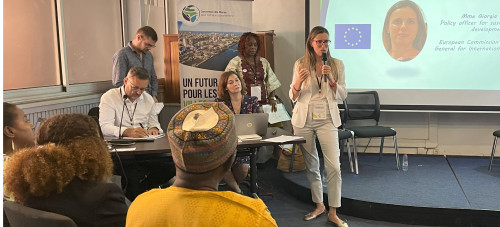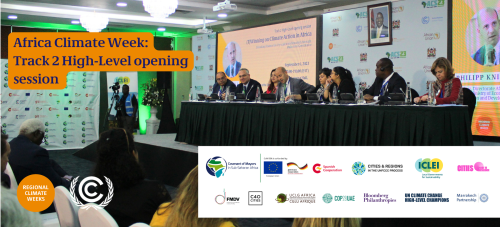Multi-level dialogues are bridging the gaps for African cities to become climate action champions
Published: 19 Nov 2021

To discuss the CoM SSA initiative’s successes and challenges, a one-hour online panel discussion was organised on 27 October in the framework of GIZ’s Urban October event. The session brought together a range of speakers to discuss how they have benefited or supported horizontal and vertical dialogues among cities in Africa.
Capitalising on the measures that Sub-Saharan cities are taking to adapt to climate change and mitigate its effects, CoM SSA supports city-to-city exchanges where local authorities can learn from each other. The initiative has also fostered multi-level dialogues between local and national governments, civil society and the private sector to ensure a holistic transition to a greener economy.
Working together to accelerate the climate transition
Sub-Saharan Africa needs structural, fast-paced change to adapt to and mitigate the effects of climate change. Urban areas are already proving that they have the agility and the capacity to take big leaps forward in the right direction. The CoM SSA panel discussion within Urban October further highlighted the need for cities to work together and continue learning from each other on how to design and implement positive and impactful measures. In fact, CoM SSA signatories – as members of a global network of cities fighting climate change – get to benefit from the experiences of other cities.
During the online session, Eng. Festus Ng’Eno, Minister of Water, Environment, Energy and Natural Resources of Nakuru County in Kenya confirmed that “CoM SSA has fostered city-to-city exchanges, which have inspired other counties in Kenya. For instance, we have helped Embu Country to join the CoM SSA initiative following the successful works in our county. We also have exchanges with Kisumu and Mombasa on climate change matters, which have been very effective.”
The need for these exchanges was further emphasized by Andrew Ihsaan Gasnolar, Research Associate at the African Centre for Cities. He stressed the “need for an accelerated commitment for best practices to be shared in a structured way and piloted in cities” and added that one of the continent’s biggest achievements is the successful “city-to-city learning: it is both the sharing of good practice, knowledge, experiences but also the benefit of transdisciplinary research”.
Providing direct support to local governments
Going beyond knowledge sharing, the panel showcased how African cities benefit from their participation in the Covenant through technical support or climate planning. In fact, one of CoM SSA’s key pillars is to strengthen internal capacities to develop climate and energy projects; this includes tools, capacity building and learning opportunities.
Jean Aloïse Biwolé is the Director of Cooperation at the Fonds Spécial d’Equipement et d’Intervention Intercommunale (FEICOM) in Cameroon. As a key partner of the Covenant in delivering capacity building trainings for local government in the country, he emphasized that “CoM SSA helps to provide trainings to mayors but also to the people who work with the local communities and with the projects on the ground in order to help local authorities make the link between essential services and the question of climate change”.
On this topic, Eng. Festus Ng’eno from Nakuru County added that “one of the key things that we have been able to do in Nakuru, thanks to the support of the Covenant of Mayors, is the implementation of our Climate Action Plan. It has given us strategy, policy and actions on what we needed to do”.
CoM SSA supports each signatory city to develop a tailored plan according to their needs and goals. Shea O’Neil, who works at the Project Coordination Unit of the initiative, reminded the audience that “the Member State Organisations working with the Covenant – AECID, AFD, Expertise France and GIZ – have different approaches based on their relationship with the cities they work with. However, they exchange frequently amongst them about what is working and what is not working, sharing best practices and engaging in technical deep-dives”. The initiative – financed by the European Union (EU), the Federal Ministry for Economic Cooperation and Development (BMZ), and the Spanish Agency for International Development Cooperation (AECID) – is bearing fruit: “CoM SSA’s implementing partners” – she added – “are currently working on 20 projects and are close to completing 10 Sustainable Energy Access and Climate Action Plans (SEACAP). Combined, these projects could unlock over € 180 million in climate finance”.
Working with all levels of public authorities
The final remarks of the panel were to discuss how the Covenant has enabled different levels of public authorities to champion climate action. They specifically showcased how CoM SSA creates networks to include or prioritize climate change and energy in the local, regional and national agendas.
For instance, through the initiative’s support, Nakuru County completed its Climate Action Plan in a way as to align it with Kenya’s Climate Action Plan, thus creating new opportunities for both levels of government to access climate finance. Eng. Festus stated that they “have been able to create a platform for exchange between national and sub-national organs of governance”.





